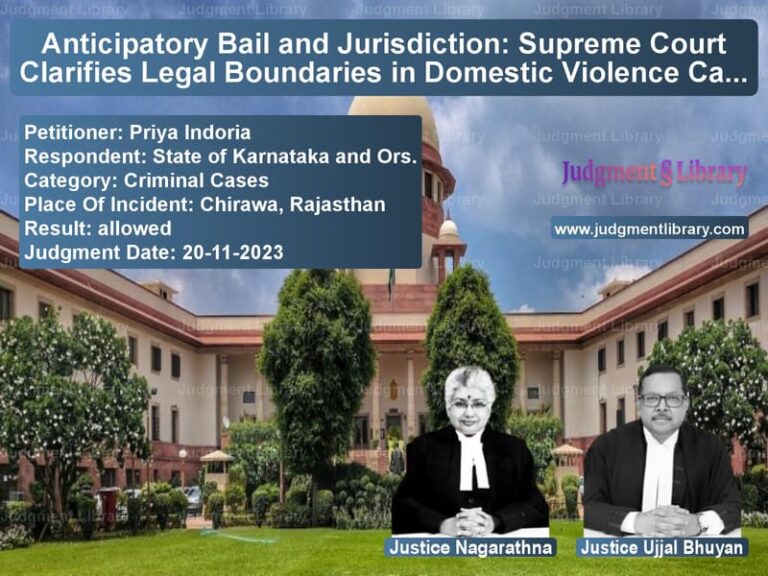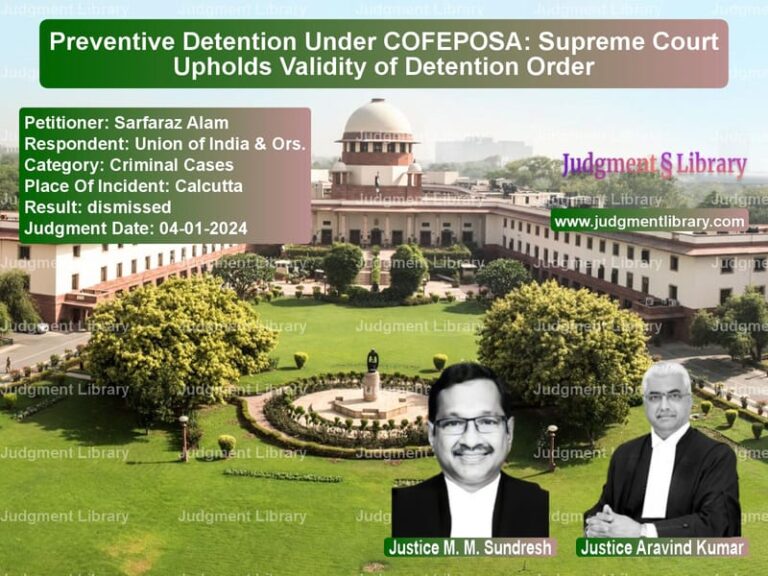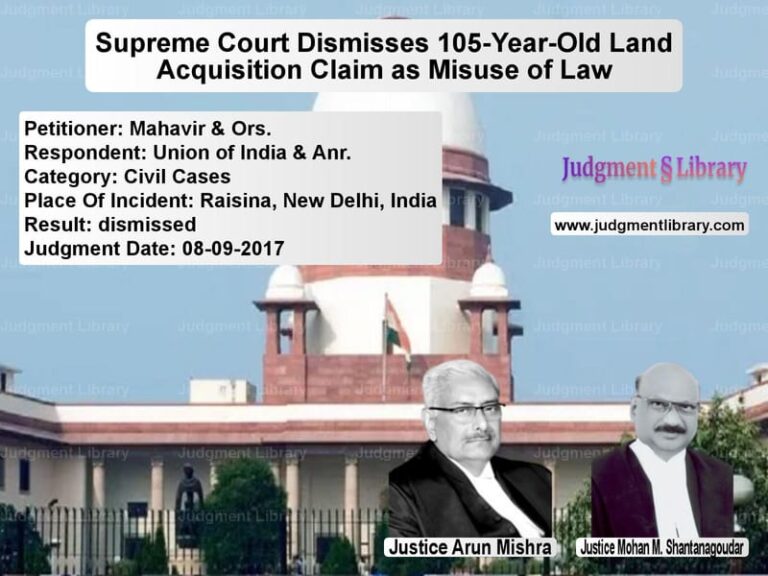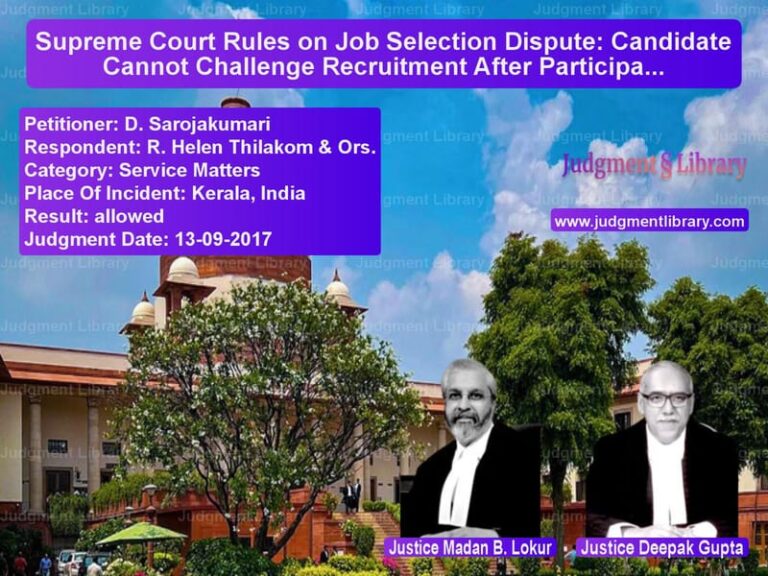Family Pension Dispute: Supreme Court Grants Widow Exclusive Rights Over Pension
The case of Nitu v. Sheela Rani & Ors. revolves around a significant legal dispute regarding the entitlement to
family pension benefits after the death of a government employee. The Supreme Court clarified that family pension is not an
inheritable asset under the Hindu Succession Act, but rather a welfare measure meant for the immediate dependents of the
deceased employee. This ruling resolved the legal ambiguity about whether parents of a deceased employee could claim a share
in the pension benefits.
Background of the Case
The appellant, Nitu, was the legally wedded wife of Yash Pal, who was a government employee under the Haryana Government.
Upon his death, the appellant was granted a family pension under the Family Pension Scheme, 1964, at Rs. 2,153 per month.
However, a legal dispute arose when the respondent, Sheela Rani (mother of the deceased), sought a share in the pension by
filing a civil suit for a succession certificate. She claimed that as a Class-I legal heir under the Hindu Succession Act, she
was entitled to a portion of the pension benefits. Initially, the Civil Judge and the Additional District Judge dismissed her
claim, ruling in favor of the widow. However, the Punjab and Haryana High Court reversed this decision, ruling that the mother
was entitled to a share in the pension.
Arguments of the Appellant
The appellant, Nitu, argued:
- The family pension is governed by the Family Pension Scheme, 1964, and does not form part of the deceased’s estate.
- The pension is a welfare measure for the spouse and dependents, not an asset that can be divided under the Hindu Succession Act.
- The scheme explicitly states that only the spouse is entitled to receive the pension.
- Allowing the mother to claim a share would defeat the purpose of family pension as a support system for the widow.
Arguments of the Respondent
The respondent, Sheela Rani, presented the following arguments:
- As a Class-I heir under the Hindu Succession Act, she had an equal right to inherit her son’s estate, including his pension.
- Yash Pal died intestate, meaning that all his assets, including pension benefits, should be distributed equally.
- The High Court correctly interpreted the Hindu Succession Act and recognized her right to succession.
Legal Interpretation and High Court Ruling
The Punjab and Haryana High Court ruled in favor of the respondent, reasoning that:
- Since Yash Pal died without a will, his pension benefits should be distributed as part of his estate.
- Under Hindu law, the mother and wife are both Class-I heirs, and both should be entitled to pension benefits.
- The pension scheme should not override general inheritance laws.
Supreme Court’s Observations and Judgment
A bench comprising Justices Anil R. Dave and L. Nageswara Rao ruled in favor of the widow, holding that the High
Court had erred in applying the Hindu Succession Act to family pension benefits.
Key Observations
- Family pension is not an inheritable asset but a benefit designed for the sustenance of the widow and dependents.
- The pension is governed solely by the provisions of the Family Pension Scheme, 1964.
- The definition of ‘family’ under the scheme includes only the spouse and dependent children.
- The mother of a married deceased employee is not eligible under the pension scheme.
Excerpts from the Judgment
The Court stated:
“The family pension does not form part of the estate of the deceased and is solely governed by the provisions of the
Family Pension Scheme.”
The Court further ruled:
“Only the widow is entitled to the pension in accordance with the scheme. The claim of the respondent mother is untenable.”
Legal Implications
This ruling clarifies several legal principles:
- Family pension is not subject to inheritance laws under the Hindu Succession Act.
- Only designated beneficiaries under the pension scheme have a legal right to pension benefits.
- Courts should not apply succession laws to government pension benefits, which serve as welfare measures.
Impact of the Judgment
The judgment has several key implications:
- Ensuring widows receive full pension benefits without legal disputes.
- Preventing unnecessary litigation over pension entitlements.
- Reinforcing the binding nature of government pension schemes and their eligibility criteria.
Comparison with Previous Rulings
Previous Supreme Court rulings have held that pension is a welfare measure, not an inheritable asset. In cases such as Smt.
Vidhya Devi v. State of Maharashtra, the Court ruled that pension benefits should be distributed as per the governing scheme
and not under personal succession laws.
By aligning with these precedents, the Court reaffirmed the fundamental principle that pension benefits cannot be treated as
general assets that are divided among legal heirs.
Conclusion
The Supreme Court’s decision in Nitu v. Sheela Rani & Ors. reaffirms that family pension is intended solely
for the welfare of the spouse and dependent children. By ruling in favor of the widow, the Court protected the rights of primary
beneficiaries under pension schemes and ensured that pension benefits fulfill their intended purpose.
Don’t miss out on the full details! Download the complete judgment in PDF format below and gain valuable insights instantly!
Download Judgment: Nitu vs Sheela Rani & Ors. Supreme Court of India Judgment Dated 28-09-2016-1741883887148.pdf
Direct Downlaod Judgment: Direct downlaod this Judgment
See all petitions in Pension and Gratuity
See all petitions in Public Sector Employees
See all petitions in Employment Disputes
See all petitions in Judgment by Anil R. Dave
See all petitions in Judgment by L. Nageswara Rao
See all petitions in allowed
See all petitions in supreme court of India judgments September 2016
See all petitions in 2016 judgments
See all posts in Service Matters Category
See all allowed petitions in Service Matters Category
See all Dismissed petitions in Service Matters Category
See all partially allowed petitions in Service Matters Category







